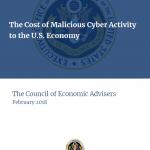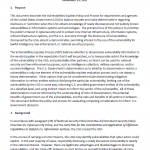
This report examines the substantial economic costs that malicious cyber activity imposes on the U.S. economy. Cyber threats are ever-evolving and may come from sophisticated adversaries. Due to common vulnerabilities, instances of security breaches occur across firms and in patterns that are difficult to anticipate. Importantly, cyberattacks and cyber theft impose externalities that may lead to rational underinvestment in cybersecurity by the private sector relative to the socially optimal level of investment. Firms in critical infrastructure sectors may generate especially large negative spillover effects to the wider economy. Insufficient data may impair cybersecurity efforts. Successful protection against cyber threats requires cooperation across firms and between private and public sectors.

